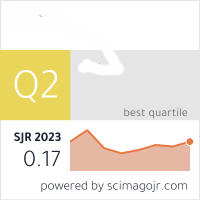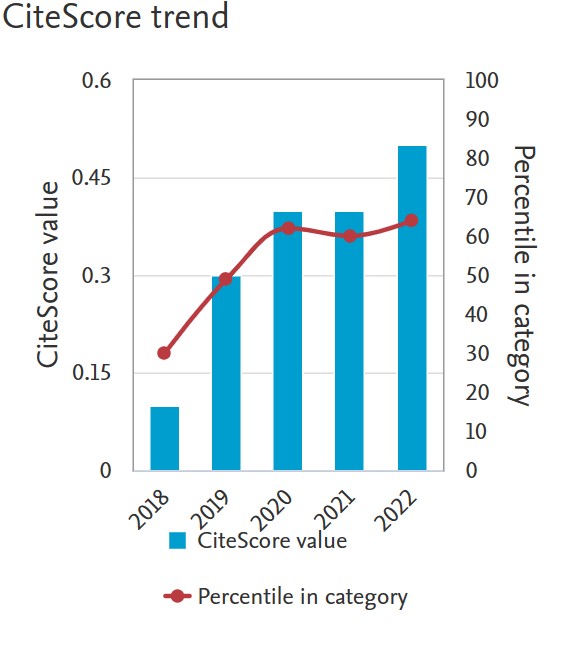Expression of FGFR2 in breast cancer Iraqi patients
Abstract
The FGFR2 gene produces a protein called fibroblast growth factor receptor 2 (FGFR2), which is involved in cell growth. Expression of FGFR2 in Iraqi breast cancer patients was the subject of this research. It was observed that FGFR2 was overexpressed in breast cancer tumors and cell lines. On the 10q26 chromosome, the FGFR2 gene has 20 exons. The FGFR2 gene has been linked to a higher risk of breast cancer in a number of studies. The relationship was confirmed by polymorphisms in FGFR2 intron 2, which increased BC susceptibility by 5–10%. The CC genotype of the SNP rs1219648 showed the lower level of the FGFr2 gene expression in both patient s and control (143.3±117.0 and 1.2±2.7, respectively) and the TT genotype showed the higher level (203.9±145.0 and 11.6±18.7). The results are shown in the table (4) and include the patients and control with the genotype rs2981582 and those with the SNP rs4563158.
Downloads
References
Wiechec E, Hansen LL. The effect of genetic variability on
drug response in conventional breast cancer treatment.
Eur J Pharmacol. 2OO9;625(1-3):122-3O.
Goke F, Franzen A, Menon R, Goltz D, Kirsten R, Boehm D,
Vogel W,Goke A, Scheble V, EIlinger J, et al. Rationale for
treatment of metastatic squamous cell carcinoma of the
lung using fibroblast growth factor receptor inhibitors.
Chest. 2012;142(4):1020-6.
Dutt A, Ramos AH, Hammerman PS, Mermel C, Cho J,
Sharifnia T, Chande A, Tanaka KE, Stransky N, Greulich
H, etal. Inhibitor-sensitive FGFR1 amplification in human
non-small cell lung cancer. PLoS One. 2011;6(6):e20351.
Weiss J, Sos ML, Seidel D, Peifer M, Zander T, Heuckmann
JM, Ullrich RT, Menon R, Maier S, Soltermann A, et al.
Frequent and focal FGFR1 amplification associates with
therapeutically tractable FGFR1 dependency in
squamous cell lung cancer. Sci Transl Med.
O1O;2(62):62ra93.
Dy GK, Mandrekar SJ, Nelson GD, Meyers JP, Adjei AA, Ross
HJ, Ansari RH, Lyss AP, Stella PJ, Schild SE, et al. A
randomized phase II study of gemcitabine and
carboplatin with or without cediranib as first-line
therapy in advanced non-small-cell lung cancer: North
Central Cancer Treatment Group Study N0528. J Thorac
Oncol. 2013;8(1):79-88.
Meng OH, Xu E, Hildebrandt MA, Liang D, Lu K, Ye Y, Wagar
EA, Wu X. Genetic variants in the fibroblast growth
factor pathway as potential markers of ovarian cancer
risk, therapeutic response, and clinical outcome. Clin
Chern. 2014;60(1):222-32.
Yermachenko A, Dvornyk V. UGT2B4 previously implicated in
the risk of breast cancer is associated with menarche
timing in Ukrainian females. Gene. 2016;590(1):85-9.
Kelleher FC, O'Sullivan H, Smyth E, McDermott R, Viterbo A.
Fibroblast growth factor receptors, developmental
corruption and malignant disease. Carcinogenesis.
;34(10):2198-205.
Frullanti E, Berking C, Harbeck N, Jezequel P, Haugen A,
Mawrin C, Parise O Jr, Sasaki H, Tsuchiya N, Dragani TA.
Meta and pooled analyses of FGFR4 Gly388Arg
polymorphism as a cancer prognostic factor. Eur J
Cancer Prev. 2011;20(4):340-7.
Charehbili A, de Groot S, van der Straaten T, Swen JJ, PijI H,
Gelderblom H, van de Velde CJ, Nortier JW, Guchelaar
HJ, Kroep JR. Exploratory analysis of candidate germline
gene polymorphisms in breast cancer patients treated
with neoadjuvant anthracycline-containing
chemotherapy and associations with febrile neutropenia.
Pharmacogenomics. 2015;16(11):1267-76.
Jiang Y, Sun S, Wei W, Ren Y, Liu J, Pang D. Association of
FGFR3 and FGFR4 gene polymorphisms with breast
cancer in Chinese women of Heilongjiang province.
Oncotarget. 2O15;6(32):34O23-9.
Eisenhauer EA, Therasse P, Bogaerts J, Schwartz LH,
Sargent D, Ford R, Dancey J, Arbuck S, Gwyther S,
Mooney M, et al. New response evaluation criteria in solid
tumours: revised RECIST guideline (version 1.1). Eur J
Cancer. 2009;45(2):228-47.
National Cancer Institute NloH, U.S. Department of Health
and Human Services. Common Terminology Criteria for
Adverse Events (CTCAE) Version 4.0. Published May 28,
; Revised Version 4.03 June 14, 2010. (Vol Available
from: Accessed 20 Nov 2016.
Abramson, J.H. WINPEPI updated: computer programs
for epidemiologists, and their teaching potential.
Epidemiologic Perspectives & Innovations 2011, 8:1
Allred DC, Harvey JM, Berardo M, Clark GM. Prognostic and
predictive factors in breast cancer by
immunohistochemical analysis. Mod Pathol.
;11(2):155-68.
Low SK, Takahashi A, Ashikawa K, Inazawa J, Miki Y, Kubo
M, Nakamura Y, Katagiri T. Genome-wide association
study of breast cancer in the Japanese population. PLoS
One. 2013;8(10):e76463.Coates AS, Winer EP, Goldhirsch A, Gelber RD, Gnant M,
Piccart-Gebhart M, Thurlimann B, Senn HJ, Panel M.
Tailoring therapies--improving the management of early
breast cancer: St Gallen international expert consensus
on the primary therapy of early breast Cancer 2015. Ann
Oncol. 2015;26(8):1533-46.
Chen Y, Shi C, Guo Q. TNRC9 rs12443621 and FGFR2
rs2981582 polymorphisms and breast cancer risk. World
J Surg Oncol. 2016;14(1):50.
Rastogi P, Anderson SJ, Bear HD, Geyer CE, Kohlenberg MS,
Robidoux A, Margolese RG, Hoehn JL, Vogel VG, Dakhil
SR, et al. Preoperative chemotherapy: updates of
National Surgical Adjuvant Breast and bowel project
protocols B-18 and B-27. J Clin Oncol. 2008;26(5):778-
Ejlertsen B. Adjuvant chemotherapy in early breast cancer.
Dan Med J. 2O16;63(5):B5222.
Marme F, Werft W, Walter A, Keller S, Wang X, Benner A,
Burwinkel B, Sinn P, Hug S, Sohn C, et al. CD24 Ala57Val
polymorphism predicts pathologic complete response to
sequential anthracycline- and taxane-based
neoadjuvant chemotherapy for primary breast cancer.
Breast Cancer Res Treat. 2O12;132(3):819-31.
Downloads
Published
Issue
Section
License
You are free to:
- Share — copy and redistribute the material in any medium or format for any purpose, even commercially.
- Adapt — remix, transform, and build upon the material for any purpose, even commercially.
- The licensor cannot revoke these freedoms as long as you follow the license terms.
Under the following terms:
- Attribution — You must give appropriate credit , provide a link to the license, and indicate if changes were made . You may do so in any reasonable manner, but not in any way that suggests the licensor endorses you or your use.
- No additional restrictions — You may not apply legal terms or technological measures that legally restrict others from doing anything the license permits.
Notices:
You do not have to comply with the license for elements of the material in the public domain or where your use is permitted by an applicable exception or limitation .
No warranties are given. The license may not give you all of the permissions necessary for your intended use. For example, other rights such as publicity, privacy, or moral rights may limit how you use the material.











